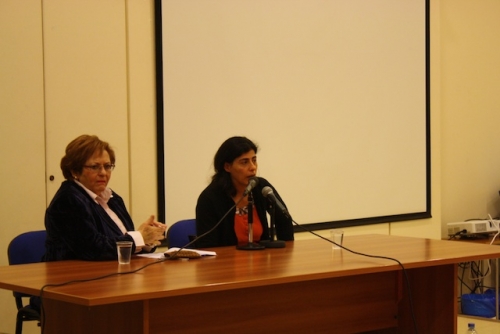
Souha Bechara attempted to assassinate Antoine Lahad of the South Lebanon army. He unfortunately survived the assassination, and currently resides in Zionist state of Israel in exile. Suha survived the Khiam prison, an Auschwitz like detention center formally used by the Israel Defense Force and its collaborators to torture and kill Lebanese and Arab freedom fighters. She was released in 1998 due to a large international campaign demanding her freedom.
Suha Beshara represents a political identity committed to justice and freedom, an identity that would be marginalized by the fighting sectarian warlords in 80’s and the 90’s. Suha’s existence in such a political context might be an asset to understanding the hegemonic nature of the national discourse on the issues of freedom and emancipation.
Suha was chosen to lead the operation due to many factors: first, because of her ability to perform such a highly delicate operation, and second for the fact that she was a woman, hence in a traditional context she aroused less suspicions if any at all. This idea suggests that the “mind” /”man” behind the operation have thought about women and statuses. The “mind” must have thought about the invisibility of women in such a male dominated field, freedom-fighting that is, and saw the possibility of taking advantage of such a situation to the benefit of the greater struggle. Yet the choice of taking advantage of a mischief in the social mentality for a political action against occupation/oppression, and in the same ridicule women’s demands of emancipation and equality to a women’s committee with in the structure or the institution of the party/movement without understanding how inherently essential the deconstruction of the inequality/mischief is speaks in volumes.
Suha Bshara represents the idea of women longing for freedom and their capability to liberate the land and the people. Yesterday’s talk that came with in the activities of the Israeliaparthiadweek.org/Beirut at the American University of Beirut was sincere and strong. She focused on the situation of the Palestinian refugees in Lebanon; it was evident for her that supporting “Palestine” in Lebanon should start with supporting Palestinian refugees in Lebanon to gain access to civil rights. This intersection should be highly considered by activists and human right’s advocates supporting the Palestinian struggle.
Our heroine openly and critically discussed the Palestinian situation in Lebanon, the institutionalization of the political movement in Lebanon and the rest of the Arab countries, the need to make use of existing technologies to connect with one another, and the need for the Lebanese leftist groups to continue their actions to support Palestinians without being intimidated by the aggressive oppression of the Lebanese regime ( namely the police’s reaction to the demonstration taking place in front of the Egyptian embassy). Courageously, she made a point long forgotten: she elaborated on how Palestinian women have carried half of the struggle and with their input the resiliency of the Palestinian camps was increased.
As much as the talk was refreshing to the ears and jolting to the mind, it remains vital that Suha Bshara should consider contributing from a gender perspective, so she sets the example we look for in our Arab heroines.
Its remains essential that Suha Beshara joins the voices of those who are working for the struggle, not only to remove the oppression of the regimes and their occupants, but also to remove the oppression of the patriarchal system and values over our contributions, history and bodies as women. Her voice is essential to object to any movement that expects women to work with their fellow brothers in fighting the structure of an oppression but not to fight the oppressions system of values.
Publisher:
Section:
Category:






